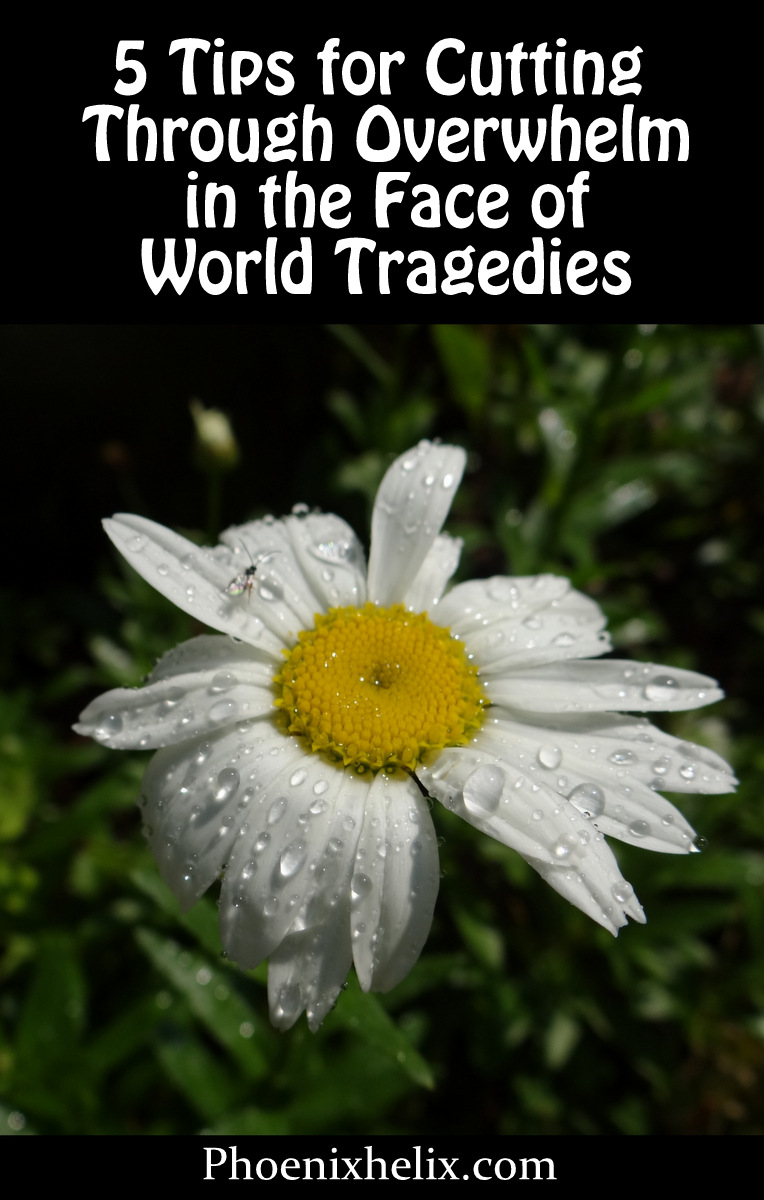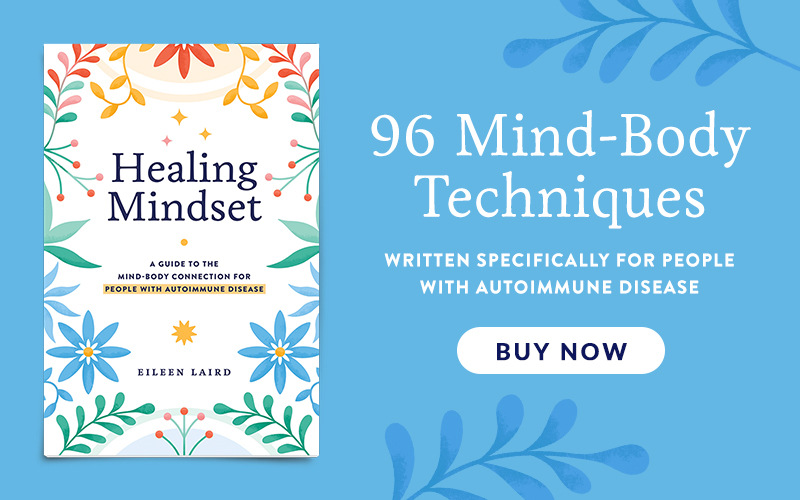
“I have had to learn to invite my broken heart to dine with me at the table. It is meaningless to run now. My broken heart is not a judgment or a crime. It is a detailed record of how I have tried to meet the violence of the world with as much openness as possible.”
~ Lama Rod Owens
Give Yourself Grace
The constant barrage of headlines about disasters, suffering, and injustice seems to be never-ending. You are neither flawed nor weak if you feel overwhelmed. You are simply human. With autoimmune disease, we have a body that’s more sensitive to stress which means autoimmune flares might arise alongside. If you have a history of trauma (which is common for people with autoimmune disease), watching disasters unfold might feel especially intense, layered on top of your own experiences. So, step one is acknowledging that this is difficult. Overwhelm often leads to feelings of numbness and compassion fatigue, where we cut off our emotions to protect ourselves from pain. That doesn’t work long-term. Self-compassion is the first step to opening your heart again. Loving ourselves through challenging times is what allows us to replenish and gain the reserves to help others.
Avoid Doomscrolling
When overwhelm hits, we often stay glued to the news and social media, wanting constant updates. We feel like we must know everything. We’re sad, anxious, and desperate to understand. We’re also hoping to see a solution. There’s a problem with this approach. Research shows that constantly checking the news (and social media) increases anxiety and depression. It doesn’t lead to helpful action. Instead, it leaves us feeling paralyzed. We may spend even more time on social media to express our outrage, which rarely leads to real-world changes. Instead, it simply depletes us further.
Don’t judge yourself if you get caught in this cycle. News websites and social media platforms are designed to keep us hooked. It takes effort to disengage, but if you do, you gain immediate benefits. Instead of constantly triggering a stress response, you allow your body to start to calm down. As you begin to feel more grounded, your brain has space to process your emotions and consider ways to truly help.
How much news and social media is okay? Everyone has to make that choice for themselves. I will say that we don’t need to check the news more than once a day to stay informed. The same goes for social media. Sometimes a longer break feels even better – taking a week offline and rediscovering what 3-D living (without the internet) can feel like. This isn’t an irresponsible choice. We don’t change the news by watching it. In fact, we’re much more likely to see ways to help when we aren’t distracted and exhausted by inflammatory headlines and streaming updates.
P.S. Doomscrolling is an online term, but the behavior can happen with radio, podcasts, and television news as well.
Feel Your Feelings
Sometimes the hard emotions are the ones we try to avoid feeling altogether. This doesn’t work, of course. The more we repress an emotion, the stronger it gets. It’s also more likely to come out sideways. Whether it’s anxiety, grief, or rage, those feelings find a way to express themselves. We might lash out. We might shut down. We may have trouble sleeping. We may lose mental focus. We may seek comfort through sugar, drugs, or alcohol. All of this makes autoimmune flares more likely too. Research shows that repressed emotions harm health on multiple levels.
So, what do we do? Three helpful techniques are EFT, RAIN, and Journaling. EFT stands for Emotional Freedom Technique. It’s a method that honors your feelings while encouraging self-love at the same time. I have an article and podcast here on my website that explains more. And if you’d like to try it right now, here’s a video with a guided EFT session. RAIN is a meditation technique that has four steps to navigate challenging emotions. It’s simple and very effective. Here’s an article and a podcast to guide you. Lastly, journaling is a wonderful way to process emotions. Some people are drawn to writing, while others love visual journals because they allow us to express feelings that we can’t put into words. Listen to this podcast to learn more: The Healing Power of Journaling.
I’ll be honest. Even though I’ve written a book on the mind-body connection, I often resist feeling painful emotions. But when I allow them to be expressed, my body immediately relaxes. I feel tension let go that I didn’t realize I was carrying, and my body seems to say, “Thank you.” The truth is, it’s exhausting to repress emotions.
Choose One Action to Take
A big part of feeling overwhelmed is the realization that the world’s problems are beyond our ability to solve alone, and it can leave us feeling powerless. And yet…there are ways we can make a difference. When we’re overwhelmed, we stop believing this. Don’t underestimate the power of small contributions. Power is found in small changes, small acts of kindness, small steps forward. They add up.
They say action is the antidote to anxiety. So, today, choose one action to take. There are two ways you can approach this. One is to look at the current crisis and see which organizations are providing help. Then, you can support that organization through a donation of time, money, or political action. Again, small donations are worthwhile because they become large when combined with others. Charity Navigator rates charities according to effectiveness and financial trustworthiness. Their home page will always feature charities who are helping with recent tragedies.
I also encourage you to look for an action you can take close to home. For me, when the world’s problems seem too big, I want to feel the power of making a difference in an individual’s life. Is there someone in your life who is struggling? It can be someone you love or an acquaintance. Reach out with words of support, an act of kindness, or a small way you can help. If you don’t know anyone with an immediate need, check with your local community organizations. They often have “needs” pages on their website, and there’s nothing quite as grounding and affirming as being able to fill a need by yourself. For example, a homeless shelter might need diapers, a battered women’s shelter might need clothing, or a nursing home might need visitors. Those are just a few examples. We truly do have the ability to make a difference. Don’t let the news convince you otherwise.
Do Something Joyful
The world is a “Brutaful” place – brutal and beautiful at the same time. We need to seek out the beauty to give us strength to navigate the brutal. So, while it may seem counterintuitive, when you’re feeling overwhelmed, do something that brings you joy. Find a reason to laugh. Reach out to the people you love. Hug someone. Or if you never get time alone, give yourself the gift of solitude. Do you love nature? Go to a favorite park. Do you like music? Go to a concert or simply dance in your living room. Move your body in a way that’s joyful for you. When we’re overwhelmed, we often feel stuck. Moving our bodies can also free our minds. Do you love games? Spontaneously ask your family to play, or set up a game night with friends. Do you love books? Pick something joyful and escapist. Remind yourself what you love about the world. I have a podcast called Prescription for Joy. It truly is medicinal.
Reflect More Deeply
In my book, Healing Mindset, one chapter is called “Caring for the World While Caring for Yourself”. It expands on this article, helping you reflect more deeply about how to balance autoimmune self-care with caring for others. It offers techniques for defining your priorities, identifying your unique gifts, and then making decisions in advance for how and when you want to contribute. It also helps you come up with a spectrum of giving, based on your health. The goal is to replace overwhelm with empowerment, while also avoiding the burnout that comes from trying to help everyone everywhere all at once.
You May Also Be Interested In









